The Sound of Music (1965)
Retro Review #48: An Alpine tale of tunes and tots, longing and love, and courage in the face of danger, this film reaches for the clouds and touches the soul.
The Sound of Music (1965)
+ Feature film, 2h 55m
+ Based on stage musical The Sound of Music (1959)❗🔜 by Howard Lindsay and Russel
+ Based on literature (non-fiction book) The Story of the Trapp Family Singers (1949)❗🔙🔜⭐ by Maria von Trapp
A+^
Grade: A+^ (20.0) / HOF: 150
EQ 👍A++ | 📖A+ 👥A+ 📽️A+ 🎼A+
DW 😎8.1 | 🌚9 🌝8
POPCAP 💯n/a 🍿n/a 🧢n/a
L-R 💻⬇️1️⃣ 👀⬆️4️⃣ 🛐⬆️3️⃣
I have a confession to make—sometimes a movie can really touch me emotionally, perhaps even bring tears to my eyes. I wasn’t expecting that to happen with my recent viewing of The Sound of Music, but it did. Before you revoke my man card, I promise to explain how and why this great film caught me by surprise. That will require this review to be longer and more serious in tone than my usual quick, fun take. I think it’s worth it, and I hope you will agree. But first, let’s cover the basics.
The Sound of Music is based on the true-life story of the Trapp Family Singers who fled Austria prior to World War Two when Nazi Germany annexed their homeland. The story is highly fictionalized, being based on the Rodgers and Hammerstein stage musical, which in turn was based on a 1956 German film adaptation that had made significant changes to the story as told in the 1949 memoir by Maria von Trapp. (If you’d like to read about the differences between the film and reality as caused by the artistic license used by the filmmakers, Wikipedia editors have covered that quite well here. But if you haven’t seen the film, consider this link to include spoilers.)
Julie Andrews won a Golden Globe for her performance as Maria in the film, opening the movie with the title song, “The Sound of Music”. Most of the other songs from the musical are included in the movie, with only a couple of deletions. However, Richard Rodgers composed and wrote two new songs by himself, as his lyricist partner Oscar Hammerstein had passed away. Three of the film’s songs made the American Film Institute’s list of the top 100 songs in American cinema of the 20th century: “The Sound of Music” (#10), “My Favorite Things” (#64) and “Do-Re-Mi” (#88).
In retrospect, it’s surprising that none of the songs from the film received Oscar nominations. But the adapted musical score won an Academy Award, and in all the film received ten nominations, while winning five. Director and producer Robert Wise won Best Director and also the ultimate prize, with The Sound of Music named Best Picture of the Year.
The Sound of Music regularly appears on lists of the greatest films of all time, showing up as high as #15 on a list by Rolling Stone Australia. It was also a huge box office success, lasting five years as the highest-grossing film ever, and is still one of the top-grossing films ever, adjusted for inflation.
Have you noticed that on our current overview of Dark Whimsy favorites this is our third straight review of a film set at least partly in the Alps?
Unlike those two previous films and a majority of our Dark Whimsy favorites, The Sound of Music is not considered to be a comedy. Yes, it includes a fair amount of humor, especially in the first two-thirds of the film. But most of the Whimsy is generated with music, romance and a focus on children. Andrews as Maria is a failed nun, sent by her abbey to a wealthy widower to be a governess for his seven children. She already loves music, almost immediately loves the children, bringing music into their lives, and not surprisingly, a Cinderella romance comes next.
Meanwhile, the Dark bides its time, descending upon the film in the final third as the Nazi shadow descends upon Austria.
This particular Dark Whimsy blend of humor, romance and children against a Nazi backdrop is quite similar to that used in 1997 by the award-winning Italian film, Life Is Beautiful. We will be visiting that movie later in our overview, and will consider looking closer at comparisons then.
An unfortunate truth about movies is that films viewed as “family” films are dismissed as unserious by many adults, viewed as being only for children. Indeed, that viewpoint has pretty much killed the G-rating for all practical purposes.
I hate to admit it, but I shared this particular prejudice as a young man. I had viewed The Sound of Music at least two or three times on TV as a kid. I knew the songs and that it was a good film, but didn’t consider it a special favorite. Still, when the university I attended produced the stage musical version, I learned the song “Sixteen Going on Seventeen” and auditioned for the role of Rolf.
Back then, and probably still today at colleges all over, a particular phenomenon often occurred in casting stage musicals. The best actors who auditioned, even if they were quite proficient singers, got passed over for the singing roles, which instead went to the school’s best singers who tried out. The theory held by the directors in casting was that they could teach the better singer to act, but the actors couldn’t be taught to sing better in just a short time.
Well, bad luck for me, my university had a renowned music department filled with voice majors receiving regular voice lessons. I could sing well enough to barely qualify for the school’s top choir, but I was no match head-to-head against most of my peers in the choir. So I didn’t get the part of Rolf. I was instead asked to be an assistant director for the production. After accepting that role, to make the indignity even worse, I learned that my main job was to get a better acting performance out of the guy who played Rolf!
(If I auditioned for this musical today, the part I wouldn’t get is Captain von Trapp. I can sing the heck out of “Edelweiss”, but the part would go to a more fit guy who credibly could have been in the Austrian navy.)
As assistant director, I lived with the songs of The Sound of Music every day for at least a month, maybe two. Is it fair to say I got a bit tired of those songs? Yep. Now combine that with the aforementioned prejudice against family films and you will begin to understand why I hadn’t watched The Sound of Music in over forty years, and also why my expectations for a new viewing of the film were not especially high.
I suppose that other people find tears in their eyes while watching a film for the same reasons I do, but I suppose I’ll never know that for sure. I’m too old and too happily married to care if you view it as weak or unmanly. I can only tell you what makes it happen to me. Grief over once-cherished things now lost. Reminders of pain in the past. Regrets over unfulfilled longings.
For me, acting and traveling have been the most cherished activities in my life. For health reasons, I will never be in a play again, and my travel is severely curtailed. Obviously, having spent time with the stage musical, The Sound of Music reminds me of that acting loss. When I spent time in Europe, Salzburg was my second favorite city that I visited. This was the first time I had seen this film since that visit and the beautiful Salzburg views made me long to return just once.
Romance almost always gets me. Lots of past pain and heartaches. So many emotional highs and lows of which to be reminded. The worst was when my first wife told me on her birthday (ironically April Fools’ Day) that she was pregnant, and I knew immediately that, despite her claims, I was not the father. And that our marriage was likely to end. I first met her on the Charles Bridge in Prague, still today my favorite location in my favorite city in the world. She loved Salzburg too, and a postcard I sent her from there kicked off our correspondence that eventually turned into love letters.
Unfulfilled longings? I am the oldest of thirteen siblings. After being taught to read very young, I only remember affection or quality time from my mother once, when I suffered a small injury at age four or five. I forgave her long ago. She was a flawed human who later regretted not doing better. But the memories remain as do the ghosts of the memories that were never made. It’s too late to ask now, but if I recall correctly, The Sound of Music was Mom’s favorite movie.
To my mind, the single greatest strength of the film, The Sound of Music, a film with so very many strengths to extol, is that it is probably the best cinematic portrayal ever of the longing that children have to be loved, both by a mother and by a father.
It’s interesting that this portrayal happens during the first two-thirds of the movie—the playful, less serious portion. But why not? This wasn’t a message being delivered. It was a common sense truth being included. In 1965 this wasn’t a debatable topic.
In America today many adults deny these particular needs of children, and frankly, put their own desires ahead of these needs in particular and ahead of the welfare of children in general. So much for progress.
I would argue that The Sound of Music is less of a movie for the family and more of a movie about the family. I’m not saying it’s not acceptable for kids and teens, but I think that people who enjoy and resonate with movies should see this film at least once as an adult to appreciate all it offers. By seeing this when I was young, I pigeonholed it as a family film and missed out for decades. Today, it does deliver from the past a needed message, and thus it would be even more of a shame if a kid today pigeonholes it and misses it as an adult.
You can see by my Viewpoint ratings below that I would have been willing to add four grade steps to the Entertainment Quality grade of this film for my final grade, if my grading rules allowed a grade higher than A+. That would have been an A with six plusses. That’s how highly I think of this film and how strongly I recommend it to adult you. You probably won’t connect emotionally to the film in all the same ways that I did. But there’s so much here to connect with, that I’d be willing to bet you will be emotionally touched in some ways too.
Onwards!
+ last viewed (3+) 2025-02-21, HDX7, 2.20, 7M
+ first viewed 1970s, sd2, 2.20vv, 1
+ 🪦⏳👨👩👧👦🎶💘😥🎧
+ ✅1️⃣ OK for teens and adults. | G
+ 😡+2 😵💫+1 🤬+3 🤭+1 🫣-0^^
+ 👀⬆️4️⃣
+ ✝️ +4 ➕✝️✝️✝️😇❤️❤️💒💒🩸🩸🩸💜💜🩷🩷
+ ✡️ +3 ➕✡️✡️🌗🌗😊🤍
+ 🗽 +2 ➕🕰️🇺🇸🇺🇸🇺🇸
(In this case the patriotism emoji represents Austrian, not American, patriotism.)
Last updated 2025-04-14
Please do not include spoilers in the comments.
Spoilers are permitted in the Chat for this work.

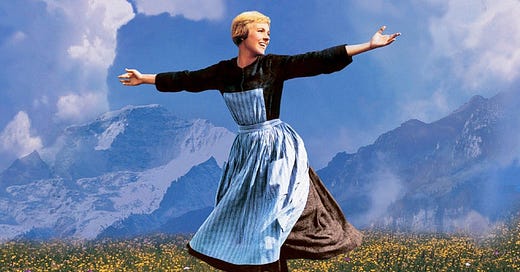


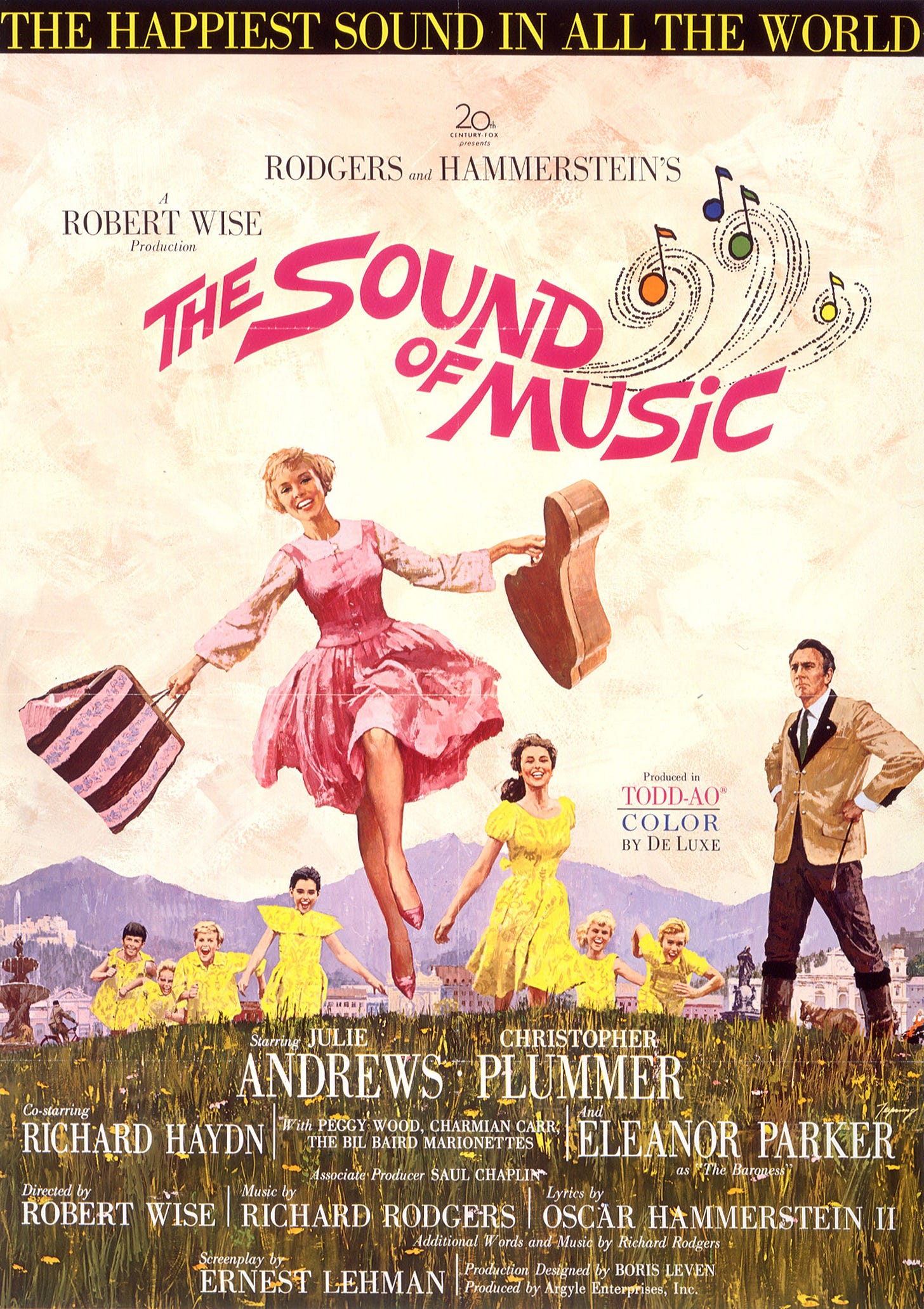
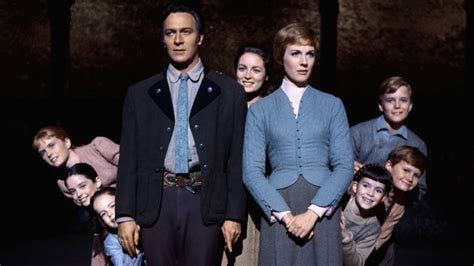

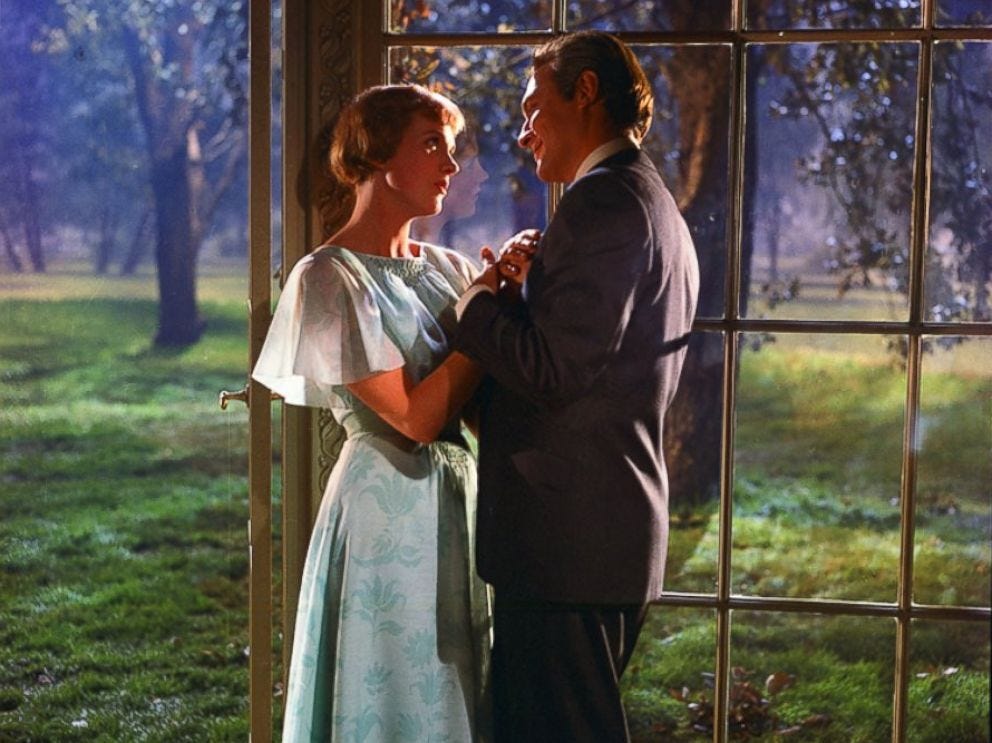
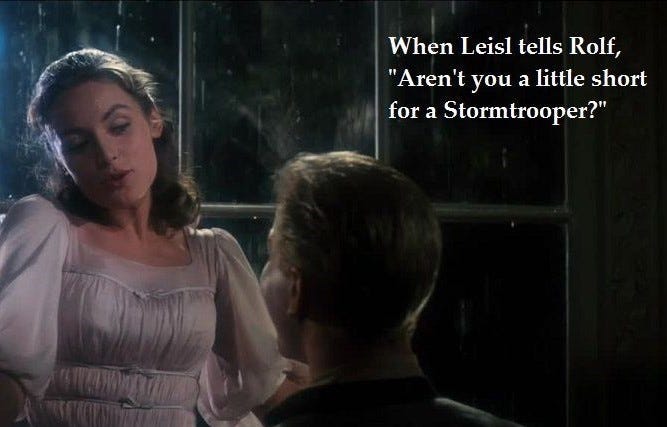
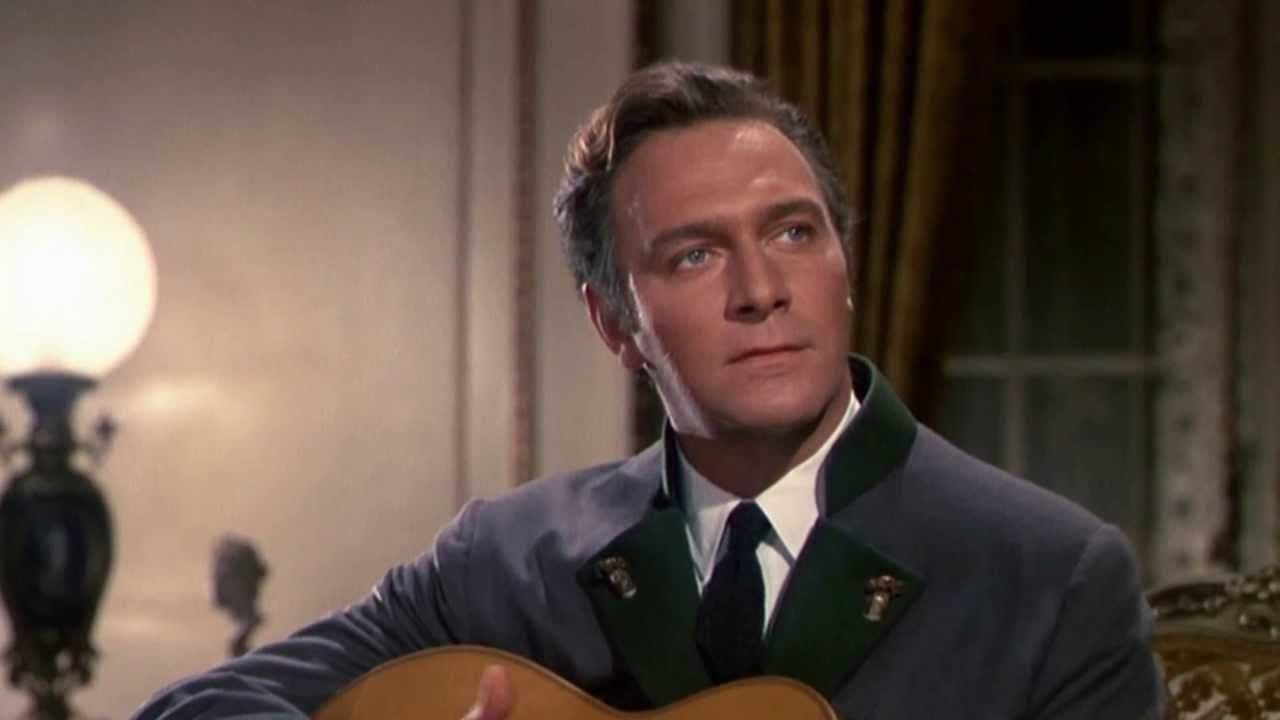
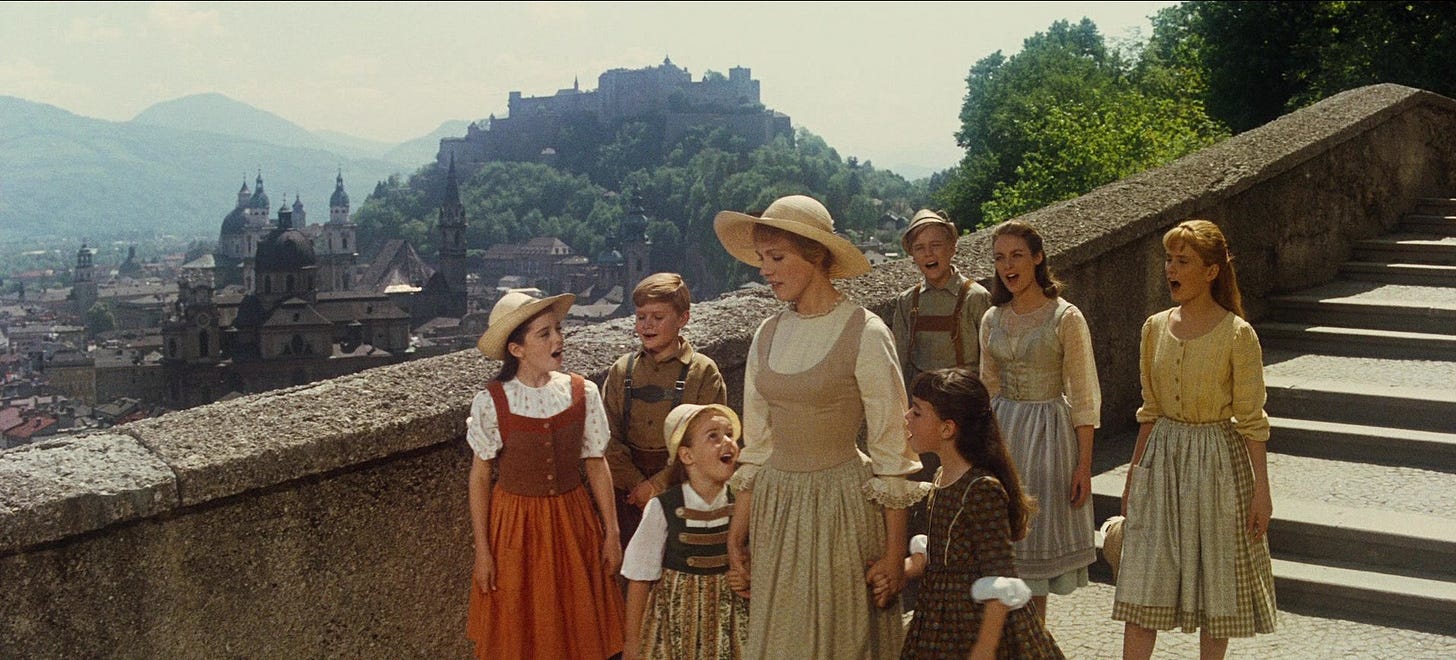
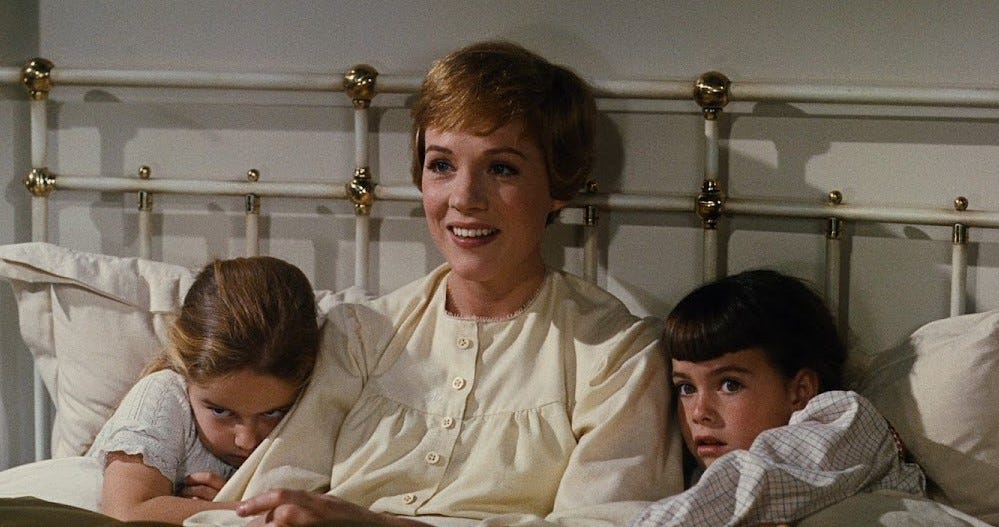
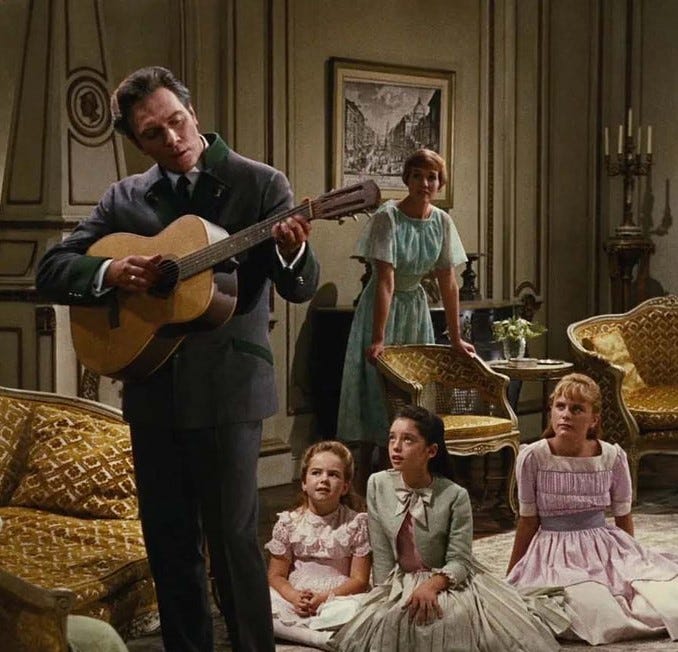
Surprisingly, I’ve never watched this movie, but I’ll add it to my list along with the book. Our homeschool is built around comparing movies to the books they came from, and we love seeing how the two measure up!
One of my favorite movies